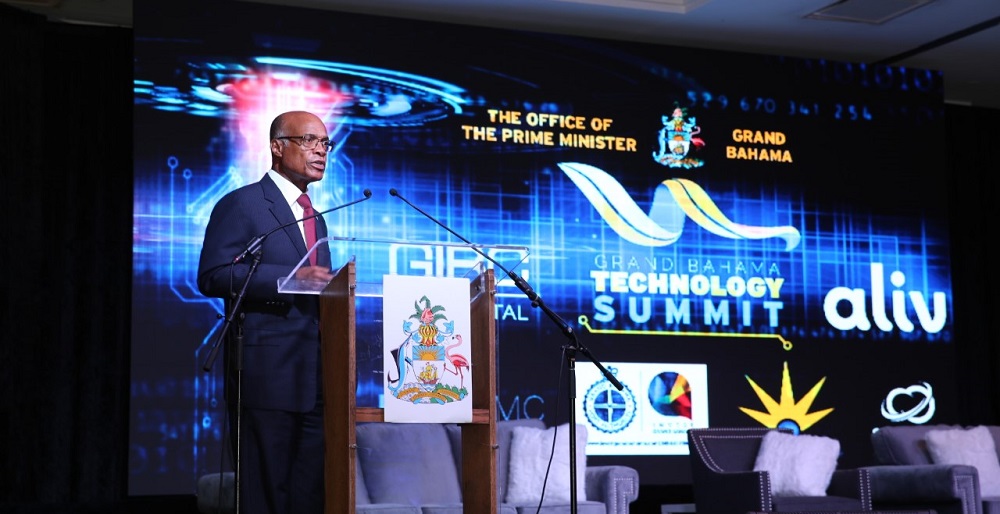#Freeport, GB, November 17, 2018 – Bahamas – Teachers will be key to the success in ‘digitalizing’ learning institutions in the country, said Minister of Education, the Hon. Jeffrey Lloyd during the Grand Bahama Technology Summit on Friday, November 16, 2018.
 Being held under the theme, “The Future is Now,” the summit was officially opened by Prime Minister, Dr. the Most Hon. Hubert Minnis, on Wednesday. The event is being held at the Grand Lucayan and ends today.
Being held under the theme, “The Future is Now,” the summit was officially opened by Prime Minister, Dr. the Most Hon. Hubert Minnis, on Wednesday. The event is being held at the Grand Lucayan and ends today.
Minister Lloyd further stated that the government’s education system is made up of 172 school campuses and 60 satellite buildings that provide support for schools all over the country’s islands and cays, and each island deserves the same quality of education and opportunities as those in the urban centres of Nassau and Freeport.
There are approximately 50,000 students from pre-k to grade 12 and 5,000 in tertiary institutions, along with about 25,000 in the private sector. It is challenging, said Minister Lloyd, to provide quality education with a cohort of between 4 to 6,000 teachers, especially specialized teachers in the areas of math and the sciences.
The government started the digitization of the educational system as soon as they came to office in 2017. He said, that in this day’s environment, the most effective tool for ensuring closure of the gap between performance and expection is technology.
The Minister of Education said that on September 9, 2018, the government formed a relationship with BTC and Cable Bahamas to provide fibre optic infrastructure to the 172 schools.
“This is a three-year, $17 million initiative; this year, we expect to spend approximately $8 million in this particular exercise.
“You will recognize that the intention is that we want every single school campus to be a smart school. That is, fully integrated utilizing the latest technology particularly as it relates to our far flung islands where we are not able, year after year, to provide those critical teachers in specialized areas — once again, like I indicated, in math and the sciences.”
The accomplish this, he continued, it will be done in phases. In the first phase, all districts will be linked with the fibre optic capability so that the schools and buildings will have full internet/Wi-Fi capacity. To date, many schools do not have full internet or Wi-Fi capability.
“So this fibre optic capability is going to provide internet access and Wi-Fi network — what we call the United  Unified Threat Management Security Solution — and will also give those campuses, those teachers, those institutions, those districts the ability for students to come with their own devices.”
Unified Threat Management Security Solution — and will also give those campuses, those teachers, those institutions, those districts the ability for students to come with their own devices.”
Phase two has already begun, continued the Minister, in that pre-primary and primary school students are receiving tablets and laptops. Some 29,000 devices will be distributed over the next 12 to 18 months.
Phase three, or EMIS, Education Management Information System is the information that will enable personnel at the Ministry of Education the ability to “recognize, understand, manipulate as necessary and to plan effectively what the requirements are for our institutions, our school systems going forward next year, next five years, next 25 years.”
The system will also permit parents and stakeholders to engage with the educational system and allow the Minister himself to know what is going on with any given school, classroom or student and provide reports on where the Ministry is with regard to the delivery of education.
“This process will facilitate student enrolment, engagement with parents, and the opportunity for administration and administrators to know precisely what is going on throughout the system.”
Minister Lloyd said that with a population of over 400,000, the country has many people who may not have completed high school, and there are some adults who may want to further their education: for those people, he continued, this system will give them the opportunity.
Referred to as MOOC — Massive Open Online Courses, it will give people the opportunity to finish high school as well as those who feel they need to upgrade their skills.
“What we have found in our system is that we are introducing a tool with which many adults are not comfortable, I’m talking about teachers. They do not have the ease, the facility, that our younger people have and so they are, quite honestly, afraid.”
He continued, “At the centre of this transformation is the teacher. In fact, I prophet to you this. It is us older folks that need to close the gap with the younger children that we are teaching. Our three and four-year-olds are coming to school already somewhat technologically savvy.
 “[At] The heart of this transformation in digitizing our educational system — we can lay down all the fibre optic we want… but if our teachers do not come along, and in fact get ahead of the curve a little bit, then the system is going to fail.”
“[At] The heart of this transformation in digitizing our educational system — we can lay down all the fibre optic we want… but if our teachers do not come along, and in fact get ahead of the curve a little bit, then the system is going to fail.”
Many of the teachers in the system have not become comfortable with technology, and so there is now a “systematic sustained transition” so that teachers can move from analog to digital. He continued, “This for us is the most fundamental objective and process that we must undertake, and that’s not a tomorrow exercise or a next year or next five years. We’ve got to do that at the Mabel Walker Institute and other training environments, right now.
“The success of this roll out, this 21st century experience is dependent upon the teachers.”
While once the teachers stood at the blackboard and taught the class, it is no longer the case he said. Students are no longer taught to regurgitate, but solve problems, and teachers are the facilitators of this.
By Robyn Adderley
Release: BIS
DIGITIZING THE EDUCATION SYSTEM – Minister of Education, the Hon. Jeffrey Lloyd, told attendees of the 2nd Grand Bahama Technology Summit, November 16, 2018 that the government is in the process of digitizing the entire educational system in the country so that all students have access to the same quality of education. (BIS Photo/Andrew Miller)
ROBOTICS DEMONSTRATION – Students of the Bishop Michael Eldon High School, making up Northern Bahamas SECME, held a Vex Robotics demonstration during the 2nd Grand Bahama Technology Summit on Friday, November 16, 2018. (BIS Photo/Andrew Miller)


 TCI News1 week ago
TCI News1 week ago
 News5 days ago
News5 days ago
 Bahamas News2 days ago
Bahamas News2 days ago
 News4 days ago
News4 days ago
 Bahamas News1 day ago
Bahamas News1 day ago
 News6 days ago
News6 days ago
 Caribbean News5 days ago
Caribbean News5 days ago
 Health1 day ago
Health1 day ago














